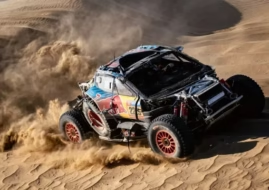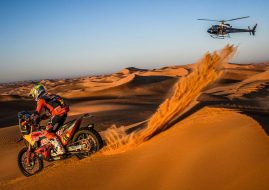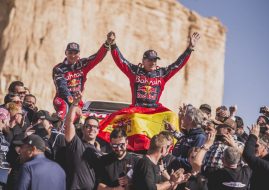Peugeot 2008 DKR 16 - Improved to Win Dakar After 26 Years of Waiting
Peugeot 2008 DKR 16 is the new and improved version of a racecar with which Peugeot returned to Dakar Rally in January 2015, after 25 years of absence. The result in their returning event was disappointing so the French manufacturer prepared the new, longer, wider, lower and more powerful successor for the 2016 Dakar Rally and Stephane Peterhansel scored his 12th victory. For Peugeot, it was the first win since 1990 when the Peugeot 405 T16 was the victorious car.

Right is the new version of Peugeot 2008 DKR 16, left is 2015 Peugeot 2008 DKR
The new Peugeot 2008 DKR has reduced overhangs
Compared to 2015 model, the new Peugeot 2008 DKR is presenting a more aggressive stance, with a raft of improvements under the skin as well. The front overhang and the rear overhang have been reduced, enhancing the car’s go-anywhere ability. This is vital when it comes to tackling the varied obstacles such as sand dunes, river beds and huge rocks that characterize the Dakar, making it one of the last true sporting adventures on Earth. The car’s dimensions are 4284 mm (length) x 2200 mm (width) x 1794 mm (height), with the wheel base of 4000 mm.
The Peugeot 2008 DKR 16 also benefits from improved aerodynamics: the bonnet and roof-mounted air-intake have been heavily revised, in order to provide more balanced downforce between front and rear. The new air scoop also ensures better airflow.

2008 DKR 16 is longer, wider, lower and more powerful than its predecessor
Redesign and significant weight saving for new Peugeot
Other evolutions lie under the new Peugeot 2008 DKR 16 carbon skin. The suspension has been redesigned to deal more effectively with the different and rough terrains. It also benefits from better weight distribution, as well as magnesium one-piece wheels for the first time, matched to lighter tires from Michelin. These replace the aluminum two-piece wheel design from the previous model, with the combination resulting in a significant weight saving.
More power from the same engine
There are some surprises under the bonnet as well. Despite the air restrictor, the 3.0-litre V6 twin-turbo diesel engine now has more power compared to the 2015 version. The driveability of the engine is increased too, which will be particularly useful during twisty stages. Peugeot is using 3.0l V6 bi-turbo diesel engine with 350 hp and 800 Nm. The maximum speed is 200 km/h. All power is transferred to rear wheels via longitudinally mounted six-speed manual sequential gearbox.
Peugeot’s engineers receive advice from experienced drivers
In designing the new car, Peugeot’s engineers got help from experienced drivers Stephane Peterhansel, Carlos Sainz and Cyril Despres. All improvements were gradually applied and assessed through a series of tests, culminating in two competitive test drives: the test drive at China Silk Road Rally and the test drive of Rally Morocco.

Same as main rival Mini All4 Racing, Peugeot is using 3.0-litres diesel engine
Bruno Famin: Lots of small improvements for a big step ahead
Peugeot Sport Director Bruno Famin commented: “There isn’t one big change that we have made on our car: instead it has been a series of small evolutions in different areas, which together we hope will amount to an overall improvement. The areas we have concentrated on include bodywork and aerodynamics – as a result of which the car looks slightly different compared to last year – as well as engine and suspension, which is all under the skin. The tests we have carried out up to now indicate that we are heading in the right direction.”
Peterhansel: You can feel the difference
Stephane Peterhansel said before he scored one more Dakar victory for Peugeot: “You can really feel the difference now that the car is longer and wider, with a lower center of gravity, because it’s a lot more stable so cornering speeds are faster. You can feel the difference in the engine as well: not only is it more powerful but also you can use all the power even at low revs. We’ve almost got a ‘problem’ now of how to manage all that power most effectively, but this is a very nice problem to have.”

Before Dakar’s victory, the new Peugeot 2008 DKR 16 had a successful race debut at Rally Morocco
Peugeot won 2016 Dakar Rally
All improvements of the 2008 DKR 16 race car resulted in historic victory at the 2016 Dakar Rally. Peugeot 2006 DKR was a dominant car and Peugeot’s driver won nine out of twelve special stages. Sebastien Loeb was fastest four times, Peterhansel three times and Sainz won two stages.
But, the Dakar isn’t just about speed and after lots of mechanical, navigational and other problems three of four Peugeot drivers fell out of top 5. Sainz retired, Loeb finished ninth and Despres came to finish as seventh. Mr. Dakar Stephane Peterhansel, despite all difficulties, scored his 12th victory and placed the French brand on the top again.
For 2017 Dakar Rally, Peugeot Sport prepared a new car, the Peugeot 3008 DKR.

Peterhansel is celebrating his 12th victory with teammate Despres
Video: Official presentation of Peugeot 2008 DKR 16
;
Photos: www.peugeot-sport.com, www.redbull.com






